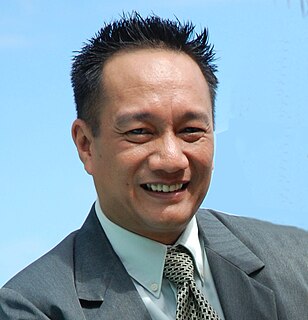
Xavier University – Ateneo de Cagayan is a private, Catholic basic and higher education institution run by the Philippine Province of the Society of Jesus in Cagayan de Oro City, Misamis Oriental, Philippines. Founded in 1933 as the Ateneo de Cagayan for Boys, it became a university in 1958, and was given its present name in honor of the Jesuit missionary St. Francis Xavier.
A medical license is an occupational license that permits a person to legally practice medicine. Most nations require such a license, bestowed either by a specified government-approved professional association or a government agency. Licenses are not granted automatically to all people with medical degrees. A medical school graduate must receive a license to practice medicine to legally be called a physician. The process typically requires testing by a medical board. The medical license is the documentation of authority to practice medicine within a certain locality. An active license is also required to practice medicine as an Assistant Physician, a Physician assistant or a Clinical officer in jurisdictions with authorizing legislation.
Licensure means a restricted practice or a restriction on the use of an occupational title, requiring a license. A license created under a "practice act" requires a license before performing a certain activity, such as driving a car on public roads. A license created under a "title act" restricts the use of a given occupational title to licensees, but anyone can perform the activity itself under a less restricted title. For example, in Oregon, anyone can practice counseling, but only licensees can call themselves "Licensed Professional Counselors." Thus depending on the type of law, practicing without a license may carry civil or criminal penalties or may be perfectly legal. For some occupations and professions, licensing is often granted through a professional body or a licensing board composed of practitioners who oversee the applications for licenses. This often involves accredited training and examinations, but varies a great deal for different activities and in different countries.

Cebu Doctors' University, abbreviated as CDU, is a private nonsectarian coeducational higher education institution located in Mandaue City, Cebu Philippines. It was founded in 1973 at Cebu City as Cebu Doctors' College (CDC), the school was formally renamed in 2005 as Cebu Doctors' University (CDU). It is organized into eight colleges, a Graduate school, and as of 2016, a Senior High school.

West Visayas State University is a public normal research university located in La Paz, Iloilo City, Western Visayas region of the Philippines. It was established in 1924 as Iloilo Normal School under the tutelage of the Thomasites, but dates back its founding in 1902 as a part of Philippine normal school system with Iloilo National High School established by the American colonial government. It later became West Visayas State College in 1965 and acquired its university status becoming West Visayas State University in 1986.

An agriculturist, agriculturalist, agrologist or agronomist, is a professional in the science, practice, and management of agriculture and agribusiness. It is a regulated profession in Canada, the Philippines, and the United States. Other names used to designate the profession include agricultural scientist, agricultural manager, agricultural planner, or agriculture researcher.

Our Lady of Fatima University is a Higher Education Institution in the Philippines known for its allied medical sciences programs and also offers Basic Education units, Senior High School, Undergraduate, Graduate, and Post Graduate degrees. It was established in year 1967 by Jose Olivares and his son-in-law, Dr. Vicente M. Santos Sr. OLFU currently has six campuses located in Valenzuela City and Quezon City in Metro Manila, Antipolo in Rizal, San Fernando City in Pampanga, Cabanatuan City in Nueva Ecija and Santa Rosa City in Laguna.

The School of Library and Information Studies of the University of the Philippines or UP-SLIS is the oldest library school in the Philippines. Formally established in March 1961 as the Institute of Library Science, it can trace it roots to 1914, making it one of the first library schools in Asia. It is an independent degree-granting unit of the University of the Philippines Diliman, and offers programs in the field of library and information science. In December 2015, the Commission on Higher Education declared the school as the first and only Center of Excellence among the universities and colleges with library and information programs in the Philippines.

Cebu Institute of Medicine (CIM) is the independently administered medical school arm of Velez College in Cebu City, Philippines.
The University of the East College of Dentistry was first established as a unit of the Philippine College of Commerce and Business Administration in 1948. The college is one of the pioneers of dental education and labeled as one of the top dental schools in the Philippines.
The Philippine Nurse Licensure Examination is a 500-item multiple choice exam to test basic nursing level competency which considers the objectives of the nursing curriculum, the broad areas of nursing and other related disciplines and competencies. It is held every June and December annually in various public schools throughout the Philippines. Room assignment for the exams are posted outside the Professional Regulation Commission building at least three days before the exam.

The University of the Philippines Manila College of Medicine (CM) is the medical school of the University of the Philippines Manila, the oldest constituent university of the University of the Philippines System. Its establishment in 1905 antedates the foundation of the UP System and makes it one of the oldest medical schools in the country. The Philippine General Hospital, the national university hospital, serves as its teaching hospital.
Medical education in Philippines is principally offered and developed by accredited and government recognized medical schools in the country.
The higher education in the Philippines is offered through various degree programs by a wide selection of colleges and universities—also known as higher education institutions (HEIs). These are administered and regulated by the Commission on Higher Education (CHED).

The Central Philippine University College of Medicine, also referred to as CPU COM, CPU College of Medicine, CPU ColMed or CPU Medicine, is the medical school of Central Philippine University, a private university in Iloilo City, Philippines. Established in 2002 and opened in 2003 with its first dean, Dr. Glenn A. M. Catedral, it is one of the youngest colleges and academic units of the university.
ICCT Colleges Foundation Inc., is a tertiary education provider with campuses located mainly in the Province of Rizal, Philippines. In Rizal it has campuses in the municipalities of Cainta, Sumulong Hi-way (Cainta), San Mateo, Cogeo, Antipolo, Taytay, Binangonan and Angono. It exists under the law of the Republic of the Philippines and offers courses that are accredited by Commission on Higher Education (CHED), Technical Education and Skills Development Authority (TESDA) and as well as industry accredited certificates.

Nigel Paul C. Villarete is a Filipino civil engineer and urban planner. He was the general manager of the Mactan–Cebu International Airport (MCIA), located in Mactan Island, Lapu-lapu, Philippines, and the chief executive officer of the Mactan–Cebu International Airport Authority (MCIAA) from October 26, 2010 to December 31, 2016.

Davao Doctors College (DDC) is a private and non-sectarian academic institution in Davao City, Philippines. College was founded in 1975 and supports House of Hopes.
The Philippine Physician Licensure Examination, also called Philippine Medical Boards, is the professional licensure examination for incoming physicians in the Philippines, exclusively administered twice a year by the Professional Regulation Commission.










